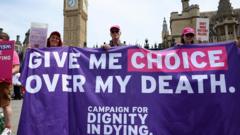How I Outsmarted the System and Ditch the TV Licence

Understanding the TV Licensing Controversy: A Case Study of Lee Stuart
In the ever-evolving landscape of media consumption, traditional television is facing stiff competition from streaming platforms like Netflix and Amazon Prime. But for many, the transition to these services comes with a complex web of legal obligations, particularly concerning TV licensing. The recent case of Lee Stuart from Kirkby, Merseyside, highlights the challenges faced by individuals navigating this system. His experience raises significant questions about the fairness and functionality of TV licensing laws, especially in light of the controversial single justice procedure (SJP).
The Background: What is a TV License?
A TV license is a legal requirement in the UK for anyone watching or recording live television broadcasts or using the BBC iPlayer to watch live or catch-up content. The revenue generated from TV licenses funds the BBC, allowing it to provide content without commercial advertising. However, as media consumption habits change, many individuals now rely solely on streaming services, raising questions about the necessity of holding a TV license.
The Rise of Streaming Services
Streaming platforms have gained immense popularity over recent years. With the ability to watch on-demand content at any time, viewers have shifted away from traditional broadcasting. According to various studies, a significant percentage of households in the UK now prefer services like Netflix and Amazon Prime over conventional television. This shift has prompted some individuals, like Lee Stuart, to consider whether they need a TV license at all.
Lee Stuart's Experience: A Battle Against the System
Lee Stuart's journey began when he moved into a new home and applied for a TV license. However, after realizing that he primarily watched content through streaming services, he decided to cancel it. His rationale was simple: he did not watch live TV or use the BBC iPlayer, which are the primary triggers for requiring a license.
Inspection and Initial Relief
In September, an inspection officer visited Lee's home. During the visit, Lee presented his case, explaining that he only used streaming services through his PlayStation. The inspector agreed that he did not watch live TV or use the iPlayer, leaving Lee feeling victorious. He thought he had successfully navigated the complexities of the licensing system.
The Unexpected Legal Threat
However, the situation took a dramatic turn in January when Lee received a letter announcing his prosecution under the single justice procedure. This legal framework was introduced in 2015 to streamline the handling of minor offenses, allowing magistrates to decide cases without the need for a court appearance. While the intention was to reduce the burden on the legal system, it has drawn criticism for potentially bypassing due process.
The Single Justice Procedure: Is It Fair?
The SJP has faced significant scrutiny since its inception. Critics argue that it lacks transparency and can disproportionately impact vulnerable groups, including the elderly and those with mental health issues. With approximately 25,000 convictions for TV license evasion reported in the year ending June 2024, the system has come under fire for the way it handles minor offenses.
Lee's Legal Battle
Upon receiving the prosecution letter, Lee was faced with a difficult decision: plead guilty and accept a fine or contest the charges and risk a larger penalty. Despite the threats of increased fines and court costs, Lee chose to fight the case, convinced of his innocence. He argued that he had not needed a TV license and was prepared to defend his position in court.
The Court Hearing: Triumph Against the Odds
In April 2025, the case was brought before magistrates. Armed with the evidence that had earlier convinced the inspection officer, Lee presented his defense once again. He highlighted the discrepancies in the inspector’s report, including the assertion that he had admitted to watching news broadcasts just days prior. Ultimately, the magistrates found insufficient evidence to sustain the prosecution, resulting in the dismissal of the case.
The Implications of Lee's Case
Lee Stuart's experience serves as a case study illustrating the complexities of the current TV licensing regime. It raises several important questions about legal procedures, the burden of proof, and the rights of individuals in similar situations. The outcome of his case also underscores the need for reform in the SJP, as many individuals may feel intimidated by the prospect of prosecution.
Public Sentiment and Calls for Reform
As Lee's story gained attention, it sparked conversations around the fairness of the TV licensing system. Numerous advocates and organizations have called for reforms to ensure that individuals are treated fairly within the legal framework. Some suggested measures include:
- Increasing transparency in the SJP process.
- Providing greater support and guidance for individuals facing prosecution.
- Reviewing the criteria for requiring a TV license in light of changing media consumption habits.
Conclusion: A Call for Change
Lee's battle against the TV licensing system sheds light on a broader issue of accountability and fairness within legal procedures. As the way we consume media continues to evolve, so too must the laws governing it. The case serves as a reminder to both individuals and lawmakers that the legal system must adapt to meet the needs of its citizens.
As you think about your own media consumption habits, consider the implications of licensing laws on your choices. Are you aware of the requirements for a TV license in your area? With the landscape of media rapidly changing, it's essential to stay informed and prepared.
FAQs
What is a TV license, and who needs one?
A TV license is required for anyone in the UK who watches live television broadcasts or uses the BBC iPlayer. It ensures funding for the BBC and covers various media consumption practices.
What happens if you don't have a TV license?
If you are found to be watching live TV or using the BBC iPlayer without a license, you may face a fine or prosecution under the single justice procedure.
What is the single justice procedure (SJP)?
The SJP allows magistrates to decide on minor offenses, such as TV licensing violations, without requiring defendants to appear in court. While intended to streamline processes, it has faced criticism for lacking transparency.
Can you appeal a TV licensing conviction?
Yes, individuals can appeal a conviction if they believe there are grounds for doing so, such as insufficient evidence or procedural errors during the original case.
How can individuals protect themselves from wrongful prosecution?
Individuals should keep records of their media consumption practices and any correspondence with TV Licensing. Understanding your rights and obligations can help in navigating potential disputes.
As the debate surrounding TV licensing continues, it raises essential questions about the rights of consumers and the responsibilities of regulatory bodies. How will the system adapt to the ever-changing landscape of media consumption? #TVLicensing #StreamingServices #LegalReform
Published: 2025-06-20 09:55:03 | Category: News



